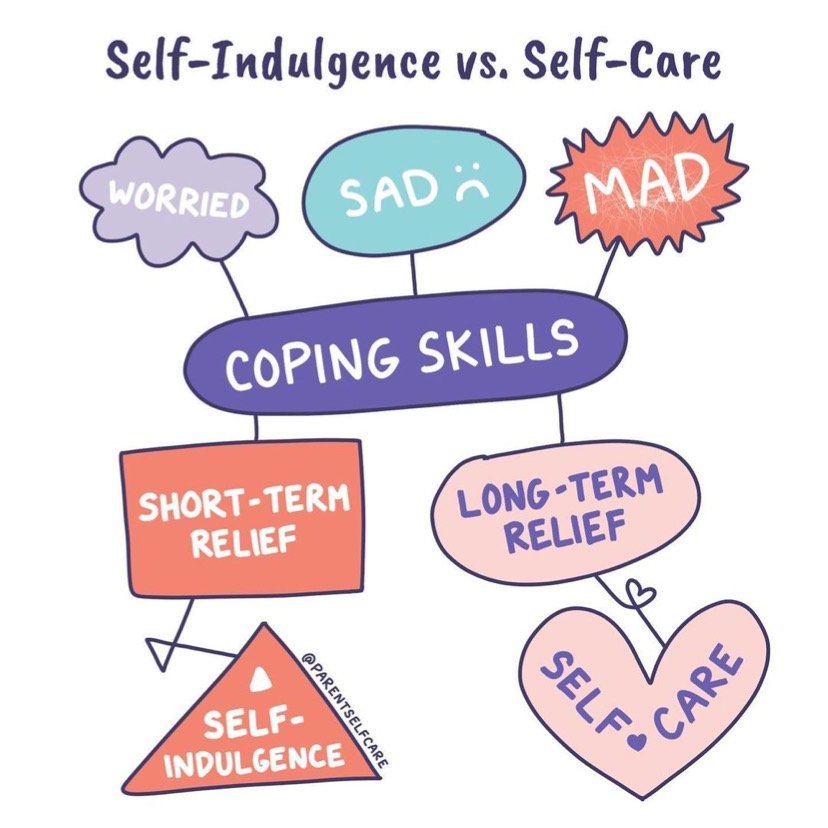The Difference Between Self-Care and Self-Indulgence
Written by Kristi Yeh, LMFT
Many parents often ask me what self-care is, especially because there are so many mixed messages on social media. Self-care is a mix of things that you look forward to doing (such as spending time with a dear friend), and things that are hard to do (such as setting limits in a challenging relationship). However, when it comes to fun self-care there is a difference between nourishing self-care and self-indulgence or “unhealthy” behaviors.
This image is a visual way to show that all coping skills serve a purpose and they are our genius way of surviving. However, not all coping skills serve us long-term. Some might call these types of coping strategies “self-indulgent” or “unhealthy.” Therapy or other reflective practices hopefully offer parents a safe space to explore and reflect upon what coping skills are still helpful and align with their values, and which ones they want to thank for helping them survive but ultimately want to let go. Many of us picked up unhealthy coping skills during childhood that helped us manage stressful situations, and as adults many people find all of those habits are not necessarily serving them anymore.
Some examples of self-care vs. self-indulgence in parenthood might be enjoying a glass of wine after the kids are in bed every now and then, compared to binge drinking on a regular basis. The mommy wine culture jokes on social media focus on the idea that raising kids is so stressful, it’s “wine o’clock” after they go to bed. This can be damaging for parents because it normalizes unhealthy coping to manage the inherent stress of parenthood.
Another common example is enjoying a show after the kids are in bed versus staying up until 2am to finish the entire season. Sleep is one of the foundations of our physical and mental wellness, and staying up late on a regular basis binging shows might be fun in the short-term, but your future tired self will not be thanking you.
Parents might binge or restrict food intake to manage stress instead of taking the time to eat yummy and balanced meals and snacks. Lastly, in our consumer-driven culture buying yourself a lovely smelling lotion versus buying all of Sephora from your phone is another example of self-care versus self-indulgence.
Self-care is something that serves us long-term, is nourishing, and helps our future self feel better. Self-indulgence can be great in moderation and often feels good in the moment, but your future self might feel tired, numb, or guilty if that’s your go-to way to cope with stress.
We are all human, and everything we do doesn’t need to be self-care or nourishing, but looking at things through this lens might help you clarify what self-care means to you in an Instagram world of confusing wellness messages.
If you want more self-care inspiration check out Self-Care 101: Self-Care Inspiration for Busy Parents on Barnes&Noble or eBook. Free inspiration is available through the Parent Self-Care VIP email newsletter that also features a webinar with my Top 20 Self-Care Practices. You can also shop the Parent Self-Care Bookshop page that features my top self-care book recommendations based on the different categories of self-care.
Resources for Parents to Address Unhealthy Coping Tools:
Substance Abuse and Mental Health Services Administration (SAMHSA)
Shopping Addiction (12-Step Program)
Psychology Today to find a therapist
Kristi Yeh is a parent of two, and a Licensed Marriage and Family Therapist who has been practicing in California for over ten years. She currently works in school-based mental health at a public elementary and middle school. A part of Kristi’s role entails discussing self-care with parents. Research shows that the better the adults take care of themselves, the healthier our children are at home and school.




